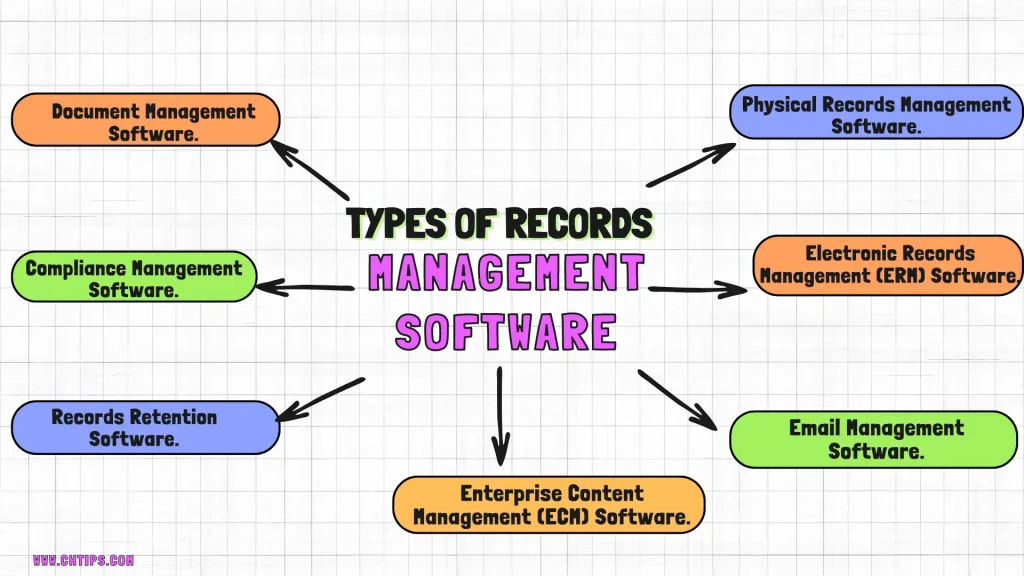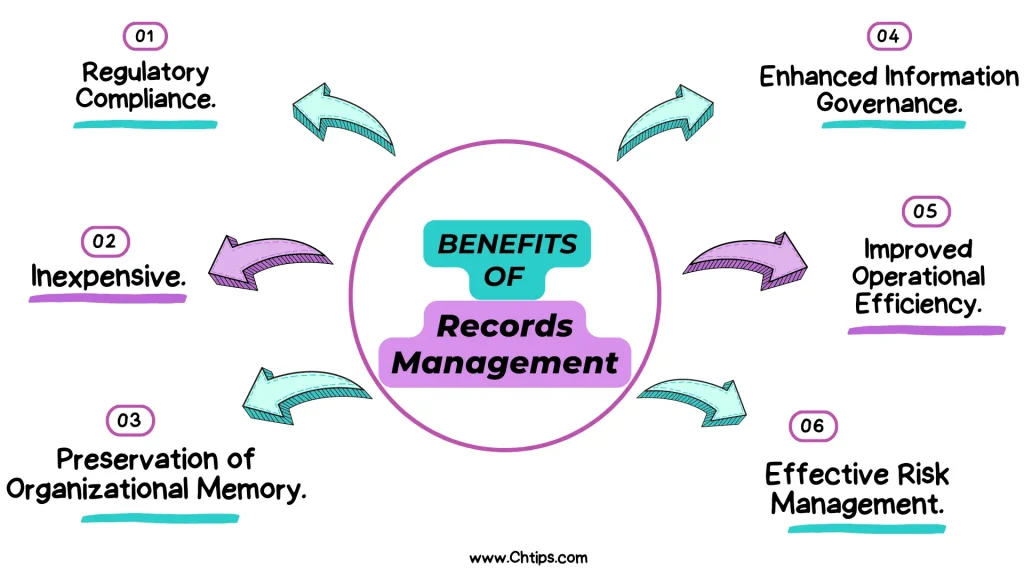Introduction To Record Management Software
When done manually, it is very tedious and challenging task to store, handle and process the documents and records. Therefore, organizations needed software solutions that performed their tasks and operations with speed, accuracy and efficiently also with a great deal of security.
Record Management Software is a software solution designed and developed to manage records effectively. The system provides a centralized platform for creating, storing, organizing, retrieving, and deleting records in a systematic and controlled manner.
The organization extensively uses several significant features, characteristics and benefits of records management software, providing an additional layer of security to maintain sensitive records.
Different Types of Records Management Software are used and utilized for other purposes. These software solutions can be more user-friendly and cost-effective compared to manual work.
The software allows users to create and capture records electronically, eliminating the need for paper-based documents. The search features can help find records faster and more accurately than others.
What is Record Management Software
The Records Management Software or Document Management Software is specially designed and developed to help the organization manage their records effectively during the complete process.
It also can create, store, manipulate, edit and destroy records according to the requirements.
The records are stored, handled and processed in an organized and centralized manner.
The record management software effectively took documents and records with an additional layer of security.
This process is done according to the norms and condition that is imposed.
Some of the significant features and characteristics of Record Management Software include the following.
- Document Storage and Organization.
- Version Control and Document Collaboration.
- Search and Retrieval.
- Security and Access Control.
- Retention and Disposition Management.
- Audit Trails and Compliance Reporting.
- Integration and Automation
Different Types of Records Management Software
Different types of Record Management Software are readily available in the market. Their significant features and principal characteristics also categorize them.
Some of the common types are included below.
- Document Management Software.
- Electronic Records Management (ERM) Software.
- Compliance Management Software.
- Physical Records Management Software.
- Email Management Software.
- Records Retention Software.
- Enterprise Content Management (ECM) Software.

1. Document Management Software.
Document Management Software Systems mainly focus on documents that can be created, modified, shared, collaborated, and retrieved.
Document Management Software significantly reduces the use and utilization of paper, reducing the overall cost and making them inexpensive.
The DMS are reliable, efficient and fast in consuming and retrieving data | information whenever needed and requested by the user.
This software or system can search documents quickly and accurately using excellent search filters, keyboards, and key phrases.
Some of the silent features and characteristics of document management software are included.
- The documents are arranged and organized in a structured manner so that the documents can be easily searched and found.
- The records are organized in files and folders for easy access and functionality.
- Easy to use and implement.
2. Electronic Records Management (ERM) Software.
Electronic Records Management [ERM] is a software specially designed and developed for storing, handling and processing electronic records.
The electronic records are saved | stored with an additional layer of security and transfer with speed and accuracy.
The records are classified and categorized in a structured manner in folders.
ERM possess some significant features and characteristics, such as capturing, classifying, and disposing of electronic records.
3. Compliance Management Software.
Compliance Management Software is specially designed and developed to help and assist organizations and groups of organizations with regulations, rules, and other norms.
Various significant uses of Compliance Management Software are included.
- Review and Manage Rules.
- Display of Editing Rules.
- Compliance Testing and Verification.
Compliance Management Software helps generate reports with accurate audits.
4. Physical Records Management Software.
Physical Records Management Software is used and utilized in storing and managing physical records such as paper, documents, printed documents, and files.
Various features of Physical Records Management Software are mentioned below.
- The records are securely stored and handled and also presented whenever required.
- The records are classified and categorized appropriately.
- The records can be easily retrieved when needed.
5. Email Management Software.
Email Management Software helps organizations/groups manage email conversations and communication.
This system stores, organize, and secures mail for further use and processing.
The emails collected can be used. Further, the emails can be organized to be retrieved easily.
6. Records Retention Software.
Records Retention Software is software that assists organizations in managing and handling records respective to their timeline.
This software helps store, protect and organize records. The rules, laws and regulations are followed by software.
Records can be archived regularly by the software to keep them safe and accessible when they are needed.
7. Enterprise Content Management (ECM) Software.
ECM software comprehensively manages organizational content, including documents, records, images, and videos.
What are the 3 Main Types of Records?
The 3 main types of records are listed below.
- Paper Records.
- Electronic Records.
- Hybrid Records.
Purpose of a Record Management System?
Some of the significant purposes of a record management system are listed below.
- Organization and Access.
- Compliance and Legal Requirements.
- Risk Management.
- Space and Cost Efficiency.
- Collaboration and Workflow.
- Records Retention and Disposition.
5 Advantages and Benefits of Records Management?
The Record Management Software has several advantages. I have mentioned some of them in tabular form.
- Regulatory Compliance.
- Enhanced Information Governance.
- Improved Operational Efficiency.
- Effective Risk Management.
- Inexpensive.
- Preservation of Organizational Memory.

1. Regulatory Compliance.
The data, information and documents are stored in a structured format to maintain accuracy and efficiency. The records management system obeys the laws, terms, conditions and regulations that are industry standards.
2. Enhanced information governance.
Records management helps enhance effective governance by engaging in policies, procedures, and guidelines for managing records.
3. Improved Operational Efficiency.
The structured and organized records management system significantly reduces the time spent searching data, information and documents.
The improved operational efficiency is increased considerably by the speedy time in the record retrieval process.
4. Effective Risk Management.
Records management helps assure data and records from mishandled and corruption because of an additional layer of security features.
A record management system can protect vital documents and records.
5. Inexpensive.
The records management systems are relatively inexpensive because they reduce the need for physical storage. Therefore, storing data and information does not require a high volume of space, which can be expensive.
What are the Four Stages of Record Management?
Create, maintain, store, and dispose of.
What are the Five 5 Functions of Records?
The five functions of Records are as follows.
- Creation/Receipt.
- Classification/Indexing.
- Storage/Preservation.
- Retrieval/Access.
- Disposition/Retention.
Importance of Record Management System
There is great importance in Record Management Systems for the following reasons.
- Efficient Information, Data, and Document Retrieval.
- Compliance and Legal Obligations.
- Risk Mitigation.
- Inexpensive and Space Efficiency.
- Collaboration and Workflow Improvement.
- Preservation of Organizational Knowledge.
Records Management Systems Examples
4 Examples of records management systems that are primarily and extensively used are.
- Microsoft SharePoint.
- OpenText Content Suite.
- IBM Enterprise Content Management (ECM).
- File Hold.
- Laserfiche.
- Alfresco
Record Management Software PDF Download
Essential Features of a Record Management System?
- Document Capture and Creation.
- Document Storage and Organization.
- Search Factors.
- Search and Retrieval.
- Version Control.
- Access Control and Security.
- Audit Trails and Reporting.
- Integration.
- Enhanced Performance.
- User-Friendly Interface.
Recommended Reading
- Which Statement Describes A Characteristic of Cloud Computing
- Top 10+ Pros and Cons of Digital Transformation and Workplace
- What is Integrated Document Management System | 4 Types, Components
- Which Factors Have Made Edge Computing Cheaper and Easier?
- How Does Edge Computing Reduce Latency For End Users
- How Can Edge Computing be Used to Improve Sustainability 5 Reasons
- What is System Utilities Software
- Cloud Computing
What are 2 Types of Record keeping?
- Manual.
- Digital.
Records Management Software Paid
Records Management Software Free Download
Useful Video: Record Management Software
Frequently Asked Questions [FAQs] Record Management Software
What is an example of a record management system?
Police Record Management Software is one example of record management software [RMS].
Different types of records management programs?
There are 2 different types of record management programs such as.
1. On Premises | Desktop Software.
2. Cloud-Based Software.
What are 5 examples of records?
Documents, electronic records, photographs, videos, databases.
What are the four types of record keeping?
Official records, transitory records, non-records, and personal records.
What are the 3 main types of records?
1. Temporary records.
2. Permanent records.
3. Unscheduled records.
How do I select the right Record Management Software for my organization?
It would help if you had software according to your requirement and needs; some of the features you must consider, such as compatibility, scalability, user friendly, reports generation, and cost.
Is cloud-based or on-premises Record Management Software better?
It entirely depends upon some features and characteristics such as security, requirement, compatibility and price.
Get In Touch
By using and implementing record management software, the organization successfully improved the overall efficiency, reliability, and accessibility with additional security for the records and documents.
The record management software has better features to store records, better governance, and reduces time and effort when the tasks and operations are performed manually.
I have also written and compiled some articles on computers and telecommunications, and please go through them.
I hope you will like reading it.
All the questions and queries related to Different Types of Records Management Software and Examples have been answered here.
If you have questions about Record Management Software's purpose, importance and benefits.
Don’t hesitate to contact me, and if you need to add, remove, or update anything from the article, please let me know in the comment section or via email.
I will be more than happy to update the article. I am always ready to correct myself.
I would like you to share this article with your friends and colleagues; this motivates me to write more on related topics.
!!! Thank You !!!
